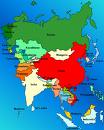China Will Not Back Down In Face Of Japanese Military Confrontation

Backing off not an option for China
A total of six Chinese surveillance ships carried out a patrol and law enforcement mission in waters around the Diaoyu Islands and its affiliated islets Friday. The move marks China’s disdain for Tokyo’s so-called “control” over the islands.
The “control” of the uninhabited islands is only reflected by the presence of the Japanese Coast Guard in the waters. The political dynamics surrounding the Diaoyu Islands will surely be reshaped once China routinely dispatches ships to patrol the islands.
China’s maritime enforcement will then serve as a strong deterrent against Japanese right-wing activists who seek to land on the islands. The situation would further change if China seized Japanese nationals who illegally enter China’s sovereign waters.
China should seek to gather momentum toward such a direction and achieve these objectives.
The consequences of China strengthening its law enforcement within 12 nautical miles of the islands include possible confrontation with the Japanese Coast Guard. As China firmly stands determined to safeguard its own sovereignty, Japan is more than likely to change its mind.
China’s strong expression of its anger and countermeasures are legitimate and reasonable.
Intense friction entails high geopolitical risks and the possibility of negative impacts to both economies. But with a high level of support from the public, China is gaining the upper hand psychologically in such a contest.
China is diplomatically resourceful in Northeast Asia compared to Japan, which is notorious in its sovereignty disputes with regional players.
It is clear that Japan touched probably the thorniest issue in bilateral ties, which in turn serves as an opportunity for China. We should seize the chance and make historic advancements in safeguarding our sovereignty by breaking Japan’s “administration” of the islands.
China should be confident about strategically overwhelming Japan. The People’s Liberation Army’s Navy and Air Force, as well as its Second Artillery Corps, are advised to increase their preparation and intensify their deterrence against Japan’s Self-Defense Forces.
China will not shy away if Japan chooses to resort to its military. As friction escalates, it is more likely for Japan to retreat in the face of unreliable US security assurances and China’s strengthened strategic combat capabilities.
The standoff broke out at a time when neither side appeared ready. The result of the spat will deeply influence the way the two countries engage with each other in the future.
For China, triumphing will cement cohesion and public confidence in the country. We cannot back off and we must win.

